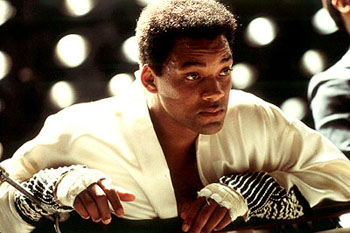![[Metroactive Movies]](/movies/gifs/movies468.gif)
[ Movies Index | Show Times | Silicon Valley | Metroactive Home | Archives ]
 The Lord of the Ring Will Smith does his best acting yet in 'Ali.' A Centered 'Ali' 'Ali' does justice to the legend By Jim Aquino THERE HAVE BEEN so many books and documentaries about the charismatic and complex Muhammad Ali--a figure who still divides sportswriters, even long after his controversial stance against the Vietnam War--that Will Smith's much-anticipated biopic Ali would probably pale in comparison to something like last year's intelligent and surprisingly poignant HBO documentary Ali-Frazier I: One Nation ... Divisible if it didn't find anything new to say about the boxing legend. What else could be said about Ali other than: he was a phenomenal boxer; he was one of the first athletes to fuse politics and sport; his trash-talking rhymes were a precursor to rap, etc.? Ali is at its weakest when director Michael Mann covers the same old territory as previous Ali bios and opts for a greatest-hits compilation approach to the material, an approach that disappointed Andy Kaufman fans when they realized Man on the Moon was merely a "Best of Andy" video blown up to Panavision. But then, just when you're ready to throw in the towel, the film surprises you, like Ali's post-rope-a-dope attack on George Foreman in the eighth round of the famed 1974 Ali-Foreman fight in Zaire. The film is at its best when it delves into aspects of Ali history that aren't discussed very often--like his spiritual side or his friendships with Howard Cosell (well played by Jon Voight) and trainer Drew "Bundini" Brown (Jamie Foxx, also good)--and when Mann finds a way to not repeat what's been already done in the documentaries. One of the best moments is a lengthy but powerful wordless sequence in Zaire, set to evocative music by West African pop star Salif Keita, in which Ali jogs through the streets of Kinshasa and discovers how much of an impact his experiences and struggles in America have had on his admirers in the motherland. (Say what you will about Mann, he's a genius when it comes to the marriage of music and imagery.) Remarkably acted by Smith--who's miles away from the sitcom acting of his previous work--the sequence is something no talking-heads documentary could ever capture. Ali has another edge over the Ali documentaries: the film is told completely from Ali's point of view (and though it's an "authorized" bio, the screenplay doesn't feel like it was heavily tampered with by Ali's camp, although the end titles neglect to mention Ali's struggles with Parkinson's disease). Because Parkinson's has made it virtually impossible for Ali to do interviews, documentarians had to resort to outside commentary, a move that especially hurt the otherwise superb When We Were Kings because of Leon Gast's borderline-offensive reliance on footage of white commentators like original wigger Norman Mailer speaking for Ali. Mann wisely keeps Ali at the center of the action. If Ali had been made 15 years ago, Mann would have probably been forced by studio execs to concoct a white journalist character to speak for Ali in order to make him less threatening to white moviegoers--remember all those lame '80s apartheid dramas that were told from the points of view of white characters? Ali may not be the greatest, but it's made with passion and vigor.
Ali (R; 147 min.), directed by Michael Mann, written by Stephen J. Rivele, Christopher Wilkinson, Eric Roth and Mann, photographed by Emmanuel Lubezki and starring Will Smith, Jamie Foxx and Jon Voight, plays valleywide. [ Silicon Valley | Metroactive Central | Archives ]
|
From the January 3-9, 2002 issue of Metro, Silicon Valley's Weekly Newspaper.
Copyright © 2002 Metro Publishing Inc. Metroactive is affiliated with the Boulevards Network.
For more information about the San Jose/Silicon Valley area, visit sanjose.com.